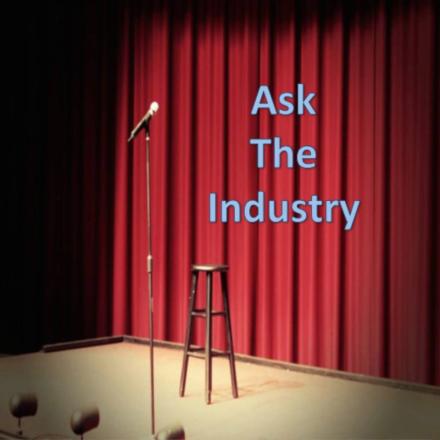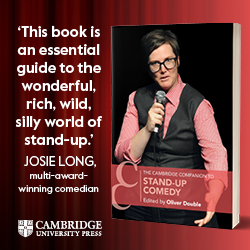
Two years ago I decided to go to the Edinburgh Fringe solo. Between signing up for a show and actually performing it, I lost a grandfather to cancer and then decided to take my comedy “career” more seriously. In the same breath I also decided to make the donation bucket for the show for Prostate Cancer. These two opposing decisions meant I had an interesting Fringe. The short story is three agents came to see me. I'd approached none of them. One was recommended by another act on their line up who knows me, one stumbled in, and one planned on coming but I never found out why my show stood out.
One of the three agents gave me their card and I was over the moon. I thought this is it. Here's where I get plucked from obscurity and thrown onto TV shows, panel shows and of course I'm being sarcastic. I'm much more grounded than that. However it was a big moment for me (as I imagine it is for all performers). When an "industry" person takes notice of you for the first time you feel a bit more "validated" in comedy - and god knows all performers love a bit of validation.
In Aug 2014 I thought I knew more than I did. But I wanted to know more. When the agent who was interested in me told me they'd signed someone else but we should "stay in touch" I asked if I could meet them for a drink. Just so I could ask then what they saw in me and why they went with this "other act". They declined and I felt confused and not sure what to do.
It was around this same time I noticed a trend of podcasts where comedians interviewed other comedians was taking hold. As much as I enjoyed this, hardly any grabbed my attention. I don’t know if it’s because I spend enough time with comedians that I don’t need to hear them talking more or the fact that I probably could ask a fellow performer a question if I wanted to. Either way most of them aren’t for me. The thing that nobody seemed to be doing is talking to the people behind the performers. The agents, bookers, promoters, PRs and more.
So... I started emailing "industry" people and invited them to meet me for a chat. A chat which would be recorded and put online. Surprisingly, that seemed more appealing to them than meeting me for a quiet coffee.
Here are some highlighted quotes, learnings and general nuggets of information direct from the horse's mouths. If you'd like to subscribe to hear the future pods (of which I make 3 per month) you can find it on iTunes, my website and Stitcher. You can also join the Facebook Group to submit your questions to the industry experts on future pods including Shane Allen, Armando Iannucci and Karen Koren - nothing is too silly, we’re all in there to learn!
Just think of it as talk radio for the comedy industry.
TV Industry
EP50 – Graham Smith – Former Commissioning Executive for Channel 4 and Channel Five
“The biggest problem in comedy is that the trickle down from arena comedy hasn’t happened. It was hoped that those who went to arena shows would start going out to regular clubs and I don’t think that’s happened as much as everyone wanted.”
“The biggest problem with Twitter is it allows people to be immediately negative about a comedy show within the first 5 minutes and not really give it a chance.”
EP 43 – Anne Edyvean – Head of the BBC Writersroom – How To Get Your Writing Noticed By The BBC
“The online people we work with say you get 6 seconds online before someone decides if they’re going to watch all your content.”
“We’re not here to make moral judgements. What’s one person's misogyny is another person's satire.”
The Live Circuit
EP48 – David Mulholland – Big Cheese at the Soho Comedy Club
“I tried Groupon. There’s no point in doing Groupon. We were only making £2 per person. And when people left we heard people saying ‘that was great. I wonder what other clubs we can find on Groupon’”
EP 24 – Peter Walsingham – Downstairs at the Kings Head
“My wife asks why do I treat comedians like children, when you find they’ve been driving round the wrong town looking for a gig then you realise some of them aren’t that bright.”
“I’ll never do a free show, because even if you’ve paid 50p you’ve made a contract. And that’s 50p I can give you when I ask you to leave.”
Comedy Authors
“The secret of being funny, depends on what you mean by ‘being funny’ because I think the secret to being funny in front of an audience is to do with creating a rapport with the audience where they believe you’re funny.”
EP 22 – Mark Fisher – Edinburgh Fringe Survival Guide – Comedian’s Book Club
“There’s this whole industry in comedy where by big agents have realised if you nurture newer and younger comedians at the early stage of their career they could be doing things on Dave within a few years so there’s big money to be had.”
“I like to think my reviews are the start of a conversation and not the end of a conversation. I am very comfortable with the world online where people can debate and talk about things.”
Agents
EP 11 – Geoff Whiting – Founder and owner of Mirth Control Comedy Clubs and Management
“Bringer gigs and pay-to-play gigs should not exist. Nobody should have to pay to go on stage.”
“I get 100 applicants for every gig in London.”
“25% of acts can drive. Which is 1 in 4. Which is a car. So I pick the driver first and then pair the acts with that driver.”
EP 26 – Charlotte Austin – Agent and co-founder at CatFace Talent
“Corporate gigs are not the best place for comedy but it’s what the organisers want. The best place for comedy is somewhere like the Comedy Store on a Friday night. But corporate gigs is an important part of that comedians diary.”



